Related Research Articles
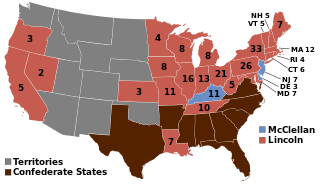
Presidential elections were held in the United States on November 8, 1864, near the end of the American Civil War. Incumbent President Abraham Lincoln of the National Union Party easily defeated the Democratic nominee, former General George B. McClellan, by a wide margin of 212–21 in the electoral college, with 55% of the popular vote. For the election, the Republican Party and some Democrats created the National Union Party, especially to attract War Democrats.
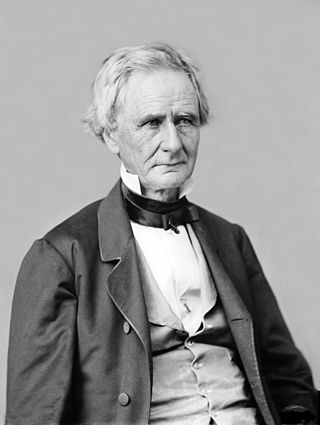
Simon Cameron was an American businessman and politician who represented Pennsylvania in the United States Senate and served as United States Secretary of War under President Abraham Lincoln at the start of the American Civil War.

William Starke Rosecrans was an American inventor, coal-oil company executive, diplomat, politician, and U.S. Army officer. He gained fame for his role as a Union general during the American Civil War. He was the victor at prominent battles in the Western theater of the American Civil War. However, his military career ended after his disastrous defeat at the Battle of Chickamauga in 1863.

Thomas Lowry Young was an American politician from the U.S. state of Ohio. Young, a Republican, served as the 33rd governor of Ohio from March 2, 1877, to January 14, 1878.

Francis Preston Blair Jr. was a United States Senator, a United States Congressman and a Union Army major general during the American Civil War. He represented Missouri in both the House of Representatives and the Senate, and was active in preventing the State of Missouri from being absorbed into the Confederacy at the beginning of the war.
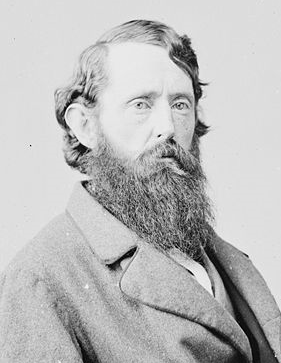
Benjamin Gratz Brown was an American politician. He was a U.S. Senator, the 20th Governor of Missouri, and the Liberal Republican and Democratic Party vice presidential candidate in the presidential election of 1872.

Edward Dickinson Baker was an American politician, lawyer, and US army officer. In his political career, Baker served in the U.S. House of Representatives from Illinois and later as a U.S. Senator from Oregon. He was also known as an orator and poet. A long-time close friend of the President of the United States, Abraham Lincoln, Baker served as U.S. Army colonel during both the Mexican–American War and the American Civil War. Baker was killed in the Battle of Ball's Bluff while leading a Union Army regiment, becoming the only sitting U.S. senator ever to be killed in a military engagement.
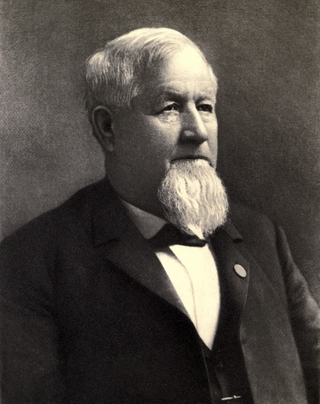
John McAuley Palmer was an American politician. He was an Illinois resident, a general who fought for the Union during the American Civil War, the 15th governor of Illinois, and presidential candidate of the National Democratic Party in the 1896 election on a platform to defend the gold standard, free trade, and limited government.
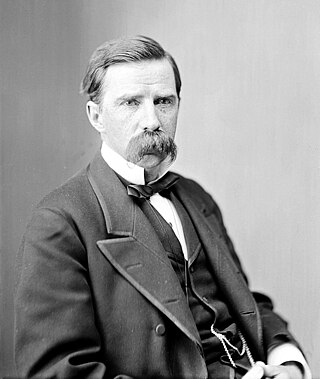
James Donald Cameron was an American banker, businessman and Republican politician who served as Secretary of War in the cabinet of President Ulysses S. Grant from 1876 to 1877 and represented Pennsylvania in the United States Senate from 1877 to 1897. Cameron succeeded his father, Simon Cameron, in both offices and as boss of the powerful Pennsylvania Republican political machine.
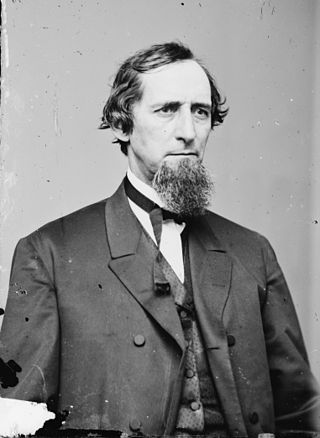
Edgar Cowan was an American lawyer and Republican politician from Greensburg, Pennsylvania. He represented Pennsylvania in the United States Senate during the American Civil War.
Franklin Archibald Dick was an American lawyer, politician and military officer during the American Civil War. He served as a Republican member of the Missouri state legislature and worked with Francis P. Blair Jr. to oppose slavery in Missouri. He served as volunteer assistant adjutant general to Brigadier General Nathaniel Lyon in the struggle to prevent Missouri secession to the Confederacy that resulted in the Camp Jackson Affair. He also served as Missouri provost marshal general and lieutenant colonel under Major General Samuel Curtis. After the war, he worked as a law partner with Montgomery Blair at the Blair House in Washington, D.C.

George Day Wagner was an Indiana politician, farmer, and soldier, serving as a general in the Union Army during the American Civil War. His controversial actions at the Battle of Franklin in 1864 overshadowed his positive performance earlier in the war.
The 2nd Missouri Infantry Regiment was an infantry regiment, formed from a voluntary regiment using the same name, that served in the Union Army during the American Civil War.

William J. Carson was a United States Army soldier and recipient of the United States' highest military decoration, the Medal of Honor, for his actions at the Battle of Chickamauga in the American Civil War.
War Democrats in American politics of the 1860s were members of the Democratic Party who supported the Union and rejected the policies of the Copperheads. The War Democrats demanded a more aggressive policy toward the Confederacy and supported the policies of Republican President Abraham Lincoln when the American Civil War broke out a few months after his victory in the 1860 presidential election.

John Henry Knight was an American military officer, lawyer, and politician. He was a Union Army officer through the American Civil War. After the war, he was the first Mayor of Ashland, Wisconsin, and was one of the leading developers of the area.

On January 15, 1867, Simon Cameron was elected to the United States Senate by the Pennsylvania General Assembly for the third time; it had previously chosen him in 1845 and 1857. The legislature voted for Cameron over the incumbent, Senator Edgar Cowan, who, though a Republican, was endorsed by the Democratic legislative caucus. With the Republican Party holding a large majority in the legislature, the main battle was for its endorsement: the caucus of Republican legislators had voted for Cameron over Governor Andrew Curtin.

Joseph Wampler Vance was an American soldier from Illinois. Educated at the United States Military Academy, Vance was named a tactical instructor of Union troops upon the outbreak of the Civil War. He served alongside William Rosecrans as Acting Assistant Adjutant General, then as Aide-de-Camp to William Carlin. Vance participated in the battles of Fredericktown, Farmington, Liberty Gap, Chickamauga, Lookout Mountain, Missionary Ridge, Resaca, and Kennesaw Mountain. Following the war, Vance helped to found the Illinois National Guard, eventually rising to become Adjutant General of Illinois (1884–1891).

John Armstrong Bross was a Colonel in the Union Army during the United States Civil War who died while leading the 29th Colored Infantry, part of the 88th Illinois Infantry, against Confederate troops. This occurred during the Battle of the Crater at the siege of Petersburg in Virginia. As he departed to fight in his final battle, Bross said: “If it is the will of Providence that I do not return, I ask no nobler epitaph than that I fell for my country at the head of this black and blue regiment.”.

Chattanooga, Tennessee, was a major rail center and a strategic vantage-point during the American Civil War, with high ground competed-for by both sides. When Union forces were besieged in the town, General Ulysses S. Grant forced a supply-route, earning him President Abraham Lincoln's gratitude.
References
- ↑ Arndt, Karl John Richard, and Olson, May E., German-American newspapers and periodicals, 1732-1955: history and bibliography, Volume 3, Quelle & Meyer, 1961.
- 1 2 3 4 5 6 Wilson, James Grant and Fiske, John, Appleton's Cyclopædia of American Biography, Volume 5, D. Appleton and company, 1888.
- 1 2 3 4 5 6 The National cyclopaedia of American biography, Volume 6, James T. White, New York, 1896.
- 1 2 Herringshaw, Thomas William, Herringshaw's National Library of American Biography: Contains Thirty-five Thousand Biographies of the Acknowledged Leaders of Life and Thought of the United States; Illustrated with Three Thousand Vignette Portraits, Volume 2, American Publishers' Association, 1909.
- ↑ Anbinder, Tyler, Nativism and slavery: the northern Know Nothings and the politics of the 1850s, Oxford University Press US, 1994.
- ↑ Richardson, Darcy G., Others: third party politics from the nation's founding to the rise and fall of the Greenback-Labor Party, iUniverse, 2004.
- ↑ Barton, William Eleazar, and Townsend, William Henry, President Lincoln, Volume 1, The Bobbs-Merrill Company, 1933 .
- 1 2 Heitman, Francis Bernard, Historical register of the United States Army: from its organization, September 29, 1789, to September 29, 1889, The National Tribune, 1890.
- 1 2 Henry, Guy Vernor, Military record of civilian appointments in the United States army, Volume 1, Van Nostrand, 1873.
- ↑ Johnson, Mark Wells, That body of brave men: the U.S. regular infantry and the Civil War in the West, Da Capo Press, 2003 .
- 1 2 Tenney, William Jewett, The military and naval history of the rebellion in the United States. With biographical sketches of deceased officers , D. Appleton & company, 1865.
- ↑ Gerteis, Louis S., Civil War St. Louis Modern war studies, University Press of Kansas, 2001.
- ↑ Scott, Robert Nicholson, The War of the Rebellion: A Compilation of the Official Records of the Union and Confederate Armies, United States War Dept ., National Historical Society, 1891
- ↑ THIRTY-NINTH CONGRESS.; FIRST SESSION. SENATE. HOUSE OF REPRESENTATIVES., New York Times, July 3, 1866, page 5.
- ↑ THE ALLEGED CONSPIRACY; The Plot to Form a Northwestern Confederacy. FULL DETAILS OF THE SCHEME. Names of Those Said to be Implicated. AN AVERRED CONSPIRACY, New York Times, July 31, 1864, page 5.
- ↑ Klement, Frank L., Dark lanterns: secret political societies, conspiracies, and treason trials in the Civil War Louisiana State University Press, 1984.